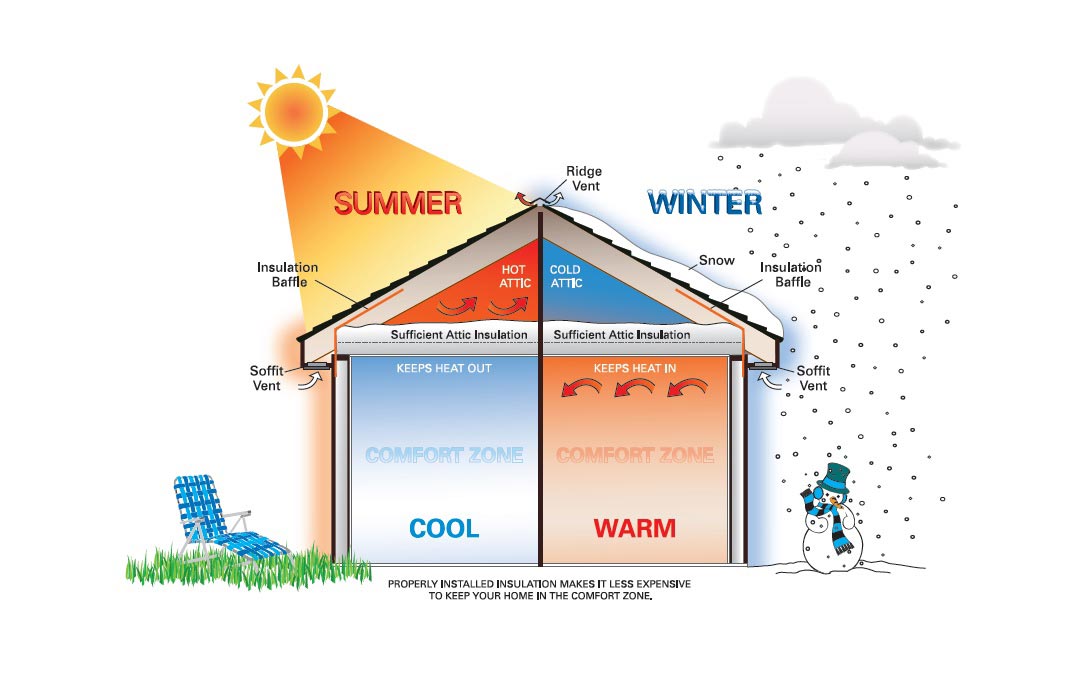Carapeastra Insights
Your go-to source for news and information on a variety of topics.
Insulation: The Cozy Secret Your Home Is Missing
Unlock the cozy comfort your home craves! Discover the secret to energy savings and year-round warmth with essential insulation tips.
How Insulation Can Lower Your Energy Bills: The Benefits You Didn't Know About
Insulation is often seen as a basic component of home construction, but its benefits extend far beyond just keeping your home comfortable. One of the most significant advantages of proper insulation is its ability to lower your energy bills. By creating a barrier that resists heat flow, insulation helps maintain a consistent indoor temperature, reducing the need for excessive heating in winter and cooling in summer. This means that your HVAC system works less, leading to lower energy consumption and, subsequently, reduced costs.
Additionally, proper insulation can enhance the overall comfort of your home. When your space maintains a stable temperature, you may find it more pleasant to live in, minimizing drafts and cold spots. Investing in insulation not only yields immediate savings on your energy bills but also contributes to long-term benefits such as increased home value and improved indoor air quality. With energy costs on the rise, it's time to consider how strategically placed insulation can make a significant difference in your expenses and comfort.

The Different Types of Insulation: Which Is Right for Your Home?
Insulation is a crucial component for maintaining energy efficiency in your home, and understanding the different types of insulation available can help you make an informed decision. The most common types include fiberglass, foam board, cellulose, and spray foam. Fiberglass insulation is popular for its affordability and effectiveness in resisting heat transfer. Foam board provides a high R-value per inch, making it ideal for basement walls and exterior applications. Cellulose, made from recycled paper, is an eco-friendly option that effectively reduces air leakage, while spray foam offers the best air-sealing properties and is perfect for hard-to-reach areas.
Choosing the right type of insulation for your home depends on various factors, including your local climate, budget, and the area you plan to insulate. In colder climates, a higher R-value is necessary to keep your home warm during winter months.
Here are some considerations to help you decide:
- Budget: Consider both upfront costs and long-term savings on energy bills.
- Installation: Some types, like spray foam, require professional installation, while others can be a DIY project.
- Space: Evaluate the space available; for example, rigid foam might work better in tight spaces.
Is Your Home Properly Insulated? Signs You Might Be Missing
Proper insulation is crucial for maintaining a comfortable and energy-efficient home. If you're wondering is your home properly insulated, there are several signs that might indicate issues with your insulation. Drafts around windows, doors, and electrical outlets are often the first signs of inadequate insulation. These drafts can lead to increased energy bills, as your heating or cooling system works overtime to maintain your desired temperature. To check for drafts, conduct a simple hand test by moving your hand around potential leak areas; if you feel a noticeable difference in temperature, it may be time to evaluate your insulation.
Another significant indicator that your home may not be properly insulated is inconsistent room temperatures. If some rooms feel significantly warmer or cooler than others, this could point to poor insulation in those areas. Ice dams forming on your roof during the winter months is another red flag, as they can be a result of heat escaping through the roof and melting snow unevenly. Additionally, high energy bills can be a financial warning sign that your insulation is failing. If you experience any of these issues, it's worth considering an insulation inspection to ensure your home is properly protected from temperature fluctuations.